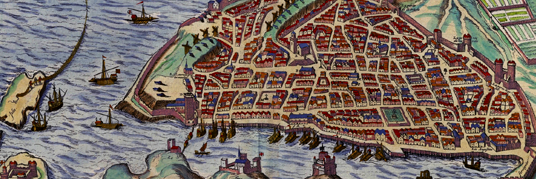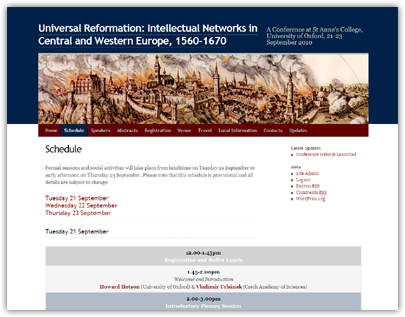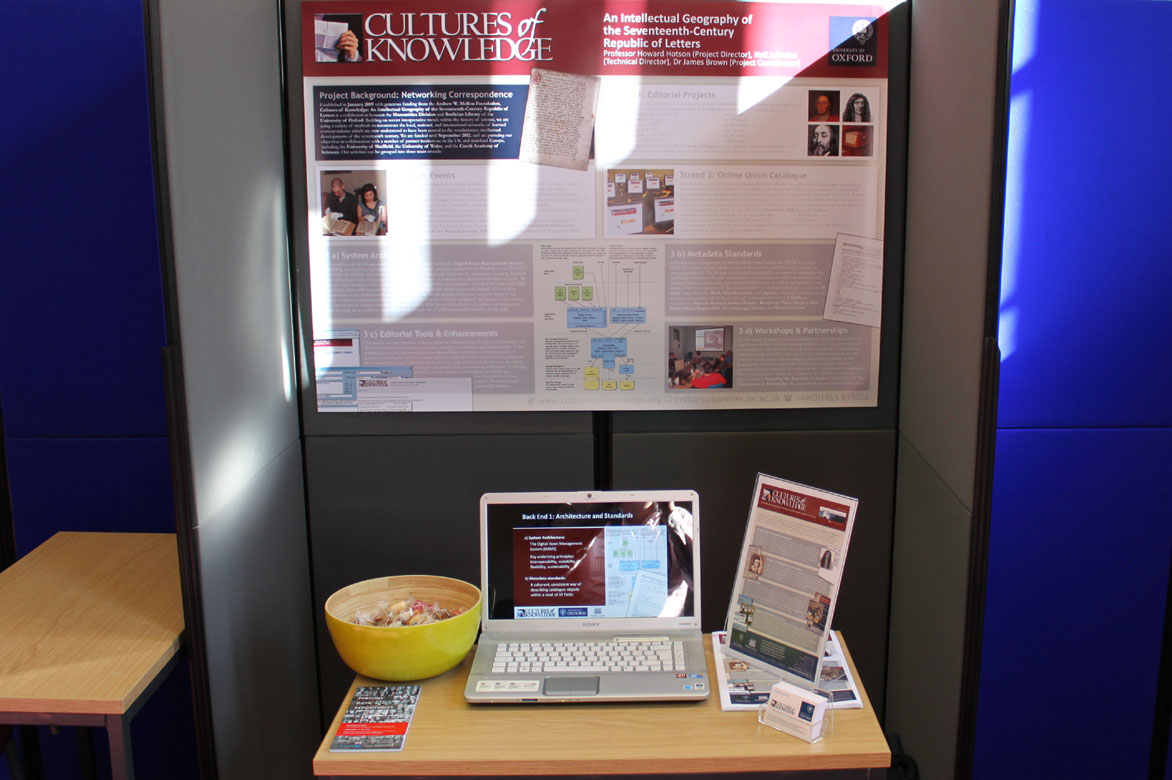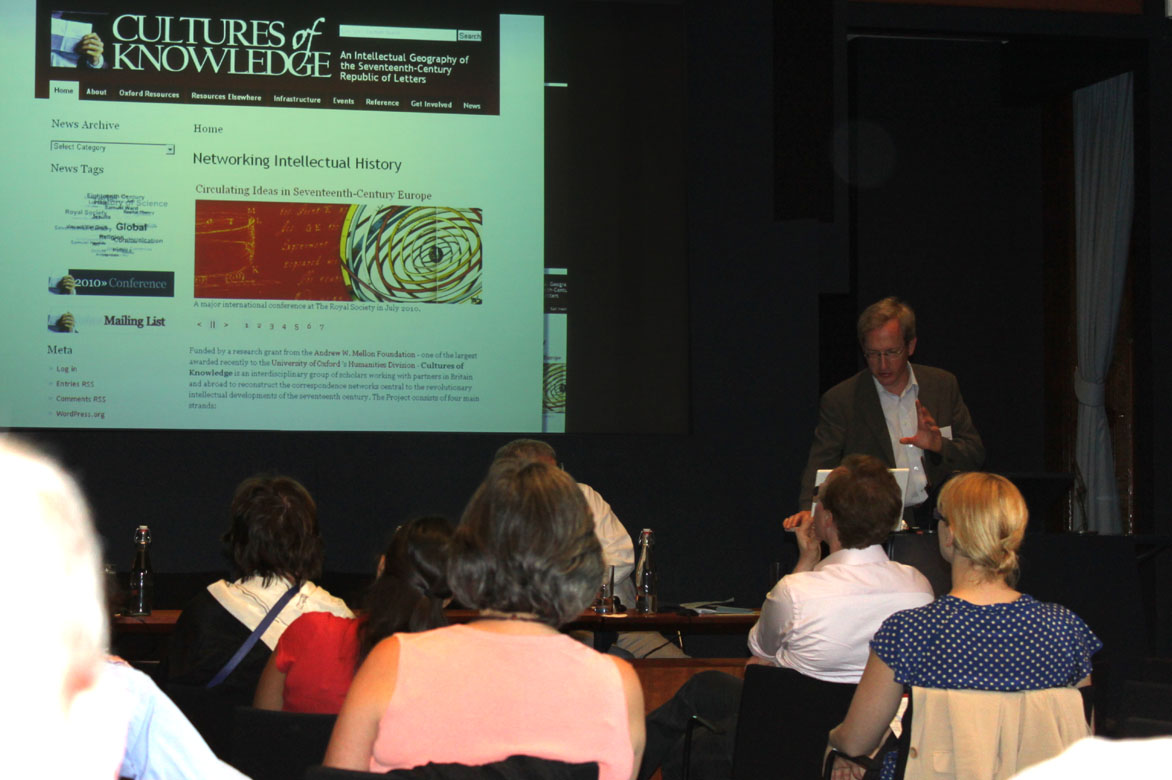* You are viewing Posts Tagged ‘Seventeenth Century’

Marseille in 1575. View sourced from Historic Cities.
In the eighth and final installment of the Project’s inaugural seminar series on Wednesday 23 June, held in conjunction with the conference John Selden (1584–1654): Scholarship in Context, Professor Peter Miller (Bard Graduate Center) delivered a wide-ranging overview of ‘Peiresc’s Mediterranean Merchant Network’. Focusing on the letters sent by the polymath from Marseille in the early seventeenth century, Miller elaborated a fascinating story of ‘Peiresc and the sea’ in four parts (which focused respectively on Marseille, space and time in the Mediterranean, merchants, and names). The small, fast nature of Marseillaise ships, especially compared to Venetian craft, meant that letters dispatched from the French port arrived at their destinations quickly (reaching Leiden, for example in fifteen days), and Peiresc’s epistolary activities in the Mediterranean were reliant on an extensive maritime network of non-elite merchants, captains, and sailors, whose identities are in many cases painstakingly recorded (along with other names and biographies) in the letters themselves. This means that it is possible to reconstruct this particular correspondence ‘cloud’ (in Miller’s phrase) in particular detail, and during discussion he provided us with a tantalising glimpse into his forthcoming digitisation initiative which will both visualise Peiresc’s Mediterranean network and link it in an innovative way to an online monograph. For past lectures in the series, please see the seminar webpage; details of the 2011 series will be available shortly.
James Brown
July 16, 2010
Conferences and Workshops, Events, Project Updates
Tags: Communication, Encyclopaedism, Europe, Jan Amos Comenius, Networks, Pansophia, Politics, Religion, Samuel Hartlib, Seventeenth Century
 We are pleased to announce that booking is now open for ‘Universal Reformation: Intellectual Networks in Central and Western Europe, 1560-1670’, the first Project conference, which will take place at St Anne’s College, Oxford, on 21-23 September 2010. Organised by Howard Hotson and Vladimír Urbánek, the event will showcase the work of a diverse group of emerging and established scholars, many from east central Europe, who will converge on the intellectual networks and traditions engendered by the upheavals of the Thirty Years War. For provisional programme information, a steadily growing lists of speaker profiles and abstracts, and to book online, please see the new conference website. The deadline for registration is Friday 10 September.
We are pleased to announce that booking is now open for ‘Universal Reformation: Intellectual Networks in Central and Western Europe, 1560-1670’, the first Project conference, which will take place at St Anne’s College, Oxford, on 21-23 September 2010. Organised by Howard Hotson and Vladimír Urbánek, the event will showcase the work of a diverse group of emerging and established scholars, many from east central Europe, who will converge on the intellectual networks and traditions engendered by the upheavals of the Thirty Years War. For provisional programme information, a steadily growing lists of speaker profiles and abstracts, and to book online, please see the new conference website. The deadline for registration is Friday 10 September.
James Brown
July 14, 2010
Conferences and Workshops, Events, Project Updates
Tags: Communication, Databases, Digitization, Europe, History of Science, Networks, Royal Society, Samuel Hartlib, Seventeenth Century, Union Catalogue

Our poster and stand at DH2010.

Presenting at the Royal Society.
Cultures of Knowledge headed to London last weekend as the Project Director and Coordinator braved thirty-degree metropolitan temperatures to share the Project’s research at two events. At Digital Humanities 2010, the flagship annual meeting of the digital humanities community hosted this year by King’s College London, we presented a poster, which focused mainly on our union catalogue and its technical underpinnings. We received very useful feedback and discovered and made connections with some highly complementary projects, including the initiative discussed below. Meanwhile, at the kind invitation of our collaborator Mark Greengrass, Howard Hotson co-delivered a keynote address at Circulating Ideas in Seventeenth-Century Europe: Networks, Knowledge, and Forms, a conference at the Royal Society organised by Ruth Connolly (University of Newcastle), Felicity Henderson (Royal Society), and Carol Pal (Bennington College). Building on Mark’s overview of Hartlib’s significance as an intelligencer and the trials and tribulations of the Hartlib Papers Project, Howard used a description of the place of Hartlib and his letters within Cultures of Knowledge as the basis for a more general overview of the Project and its aspirations, especially within the digital sphere.
Download the poster presented at DH2010
James Brown
June 23, 2010
Events, Lectures, Project Updates
Tags: Digitization, Europe, France, Isaac Casaubon, Joseph Justus Scaliger, Low Countries, Richard Thomson, Seventeenth Century
In the seventh and penultimate installment of the Project’s seminar series on Thursday 10 June, a large audience enjoyed papers by Dr Dirk van Miert (Huygens Institute) and Dr Paul Botley (Warburg Institute), both postdoctoral fellows on the Scaliger Correspondence Project, established by Professor Anthony Grafton. In his opening contribution, van Miert explored ‘The Seventeenth-Century Culture of Editing Scholarly Correspondences: The Case of Joseph Scaliger’. Via a fascinating case study of several early seventeenth-century editions of the correspondence of the French scholar (especially that prepared by Daniel Heinsius), he argued that in an early instance of the ‘institutionalisation’ of the Republic of Letters it was increasingly common for lavish printed editions of the correspondence of intellectuals to appear during or immediately after their lifetimes, often prepared by former students (Heinsius studied under Scaliger). In his concluding contribution, Botley switched the focus to two less high-profile denizens of the Republic of Letters in a paper entitled ‘The Letters of Isaac Casaubon (1559–1614) and Richard Thomson (c.1570–1613)’. Botley described his attempts to bring Casaubon’s c.2400 surviving letters (254 exchanged with Scaliger) to a wider scholarly audience by means of a definitive online edition, and introduced us to the letters of the little-known philologist and Church of England clergyman Richard Thomson, a regular correspondent of both Scaliger and Casaubon. Seminars take place in the Faculty of History on George Street on Thursdays at 3pm. For past seminars in the series, please see here.
 Podcast now available on the seminar page!
Podcast now available on the seminar page!
James Brown
June 09, 2010
Events, Lectures, Project Updates
Tags: Amsterdam, Antoinette Bourignon, Book History, Communication, Gender, Jan Amos Comenius, Low Countries, Networks, Religion, Seventeenth Century, Women

Discussions continue with Professor de Baar during the wine reception.
In the sixth installment of the Project’s seminar series on Thursday 3 June, Professor Mirjam de Baar (University of Groningen) described the epistolary practice and strategies of a seventeenth-century female prophet and mystic in a paper entitled ‘The Re-construction of a Spiritual Network: The Correspondence of Antoinette Bourignon (1616-1680)’. From her base in Amsterdam (where she purchased her own press in the late 1660s), Bourignon used a variety of textual media to disseminate the message that she was a spiritual leader – ‘The Mother’ – chosen by God to restore true Christianity on earth, and to consolidate a following around this ecumenical identity. Bourignon’s letters, argued de Baar, were central to this programme; over 600 manuscript versions survive (both originals and scribal copies), eleven different printed editions appeared during her lifetime, while nine further volumes were subsequently published posthumously. Her correspondents included luminaries such as Jan Amos Comenius (1592-1670), Robert Boyle (1627-1691), Jan Swammerdam (1637-80), and Pierre Poiret (1646-1719), as well as a wide range of socially diverse disciples who wrote to her seeking advice on a variety of spiritual and personal issues, and whose preoccupations and voices are anonymously reproduced in published responses. In consequence, her letters have a dialogic, polyphonous quality, while the same followers who wrote to her seeking guidance in turn represented an important market for the letters in their printed manifestations, suggesting a close relationship between epistolarity and the mechanics of early modern publishing, and the existence of a shrewd business model beneath the spiritual discourse (a point further underlined during subsequent discussion). Despite her failure to establish a long-term community on the island of Nordstrand, and the fact that in the later years of her life the suspicions of Lutheran clergy forced her into exile in Eastern Friesland, Bourignon maintained a prolific output of letters, and continued to combine the roles of spiritual leader, publisher of epistolary collections, and manager of what might be interpreted as a spiritually driven commercial enterprise. Seminars take place in the Faculty of History on George Street on Thursdays at 3pm. For future seminars in the series, please see here.
 Podcast now available on the seminar page!
Podcast now available on the seminar page!
James Brown
June 03, 2010
Events, Lectures, Project Updates
Tags: Amerigo Salvetti, Britain, Diplomatic History, English Civil War, Italy, Politics, Protectorate, Seventeenth Century, Tuscany
In the fifth installment of the Project’s seminar series on Thursday 27 May, Professor Stefano Villani (University of Pisa) introduced us to ‘Tuscan Readings of the English Revolution: The Correspondence of Amerigo Salvetti and Giovanni Salvetti Antelminelli’. Villani focused on the communications sent by the elder Salvetti, a Tuscan informer and diplomat based in London, to the Grand Duke of Tuscany between 1649 and 1660, during which the former dispatched both a newsletter and a personal letter on a weekly basis updating the Tuscan court on developments within the new English Republic. Villani argued that within an environment in which Italian responses to the Protectorate regime were both highly regionalized and lacking in ideological consistency, the letters reveal Tuscans to have had more interest in and sympathy for the Cromwellian administration than either Venetians (who regarded it as a military dictatorship orchestrated by a religious fanatic) or Genoans (who viewed it ambivalently as a kind of protracted Machievellian experiment). As well as describing this ‘Anglo/Tuscan moment’, Villani sketched some fascinating differences between the two styles of missive – newsletter and personal letter – both of which took over a month to reach their recipients on the peninsula. The newsletters, which are anonymous and unsigned, provide a ‘pragmatic’ third person narrative of political events free of subjective judgements and commentaries (and often enclosing translations of English documents). The personal letters, by contrast, are written in the first person, sometimes in cipher, and signed, and contain many idiosyncratic political insights as well as numerous personal references. Seminars take place in the Faculty of History on George Street on Thursdays at 3pm. For future seminars in the series, please see here.
 Podcast now available on the seminar page!
Podcast now available on the seminar page!







 Join
Join 